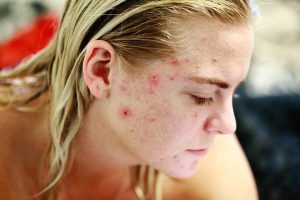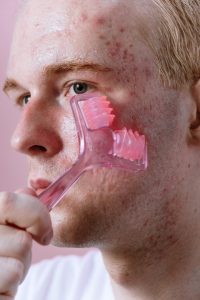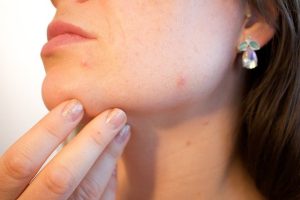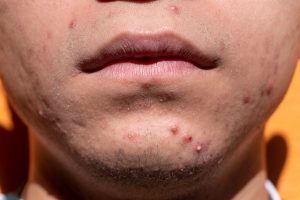
Image Source
One of the most familiar skin issues that affect both men and women is acne. It occurs when dead cells and oil clog the hair follicles and produce whiteheads, pimples, and blackheads. Mostly, teenagers are affected by this issue, yet people of all age groups can get affected. However, there are some effective treatments available for acne. The bumps and pimples may take a long time to get cured, and it can be frustrating when you notice one pimple fading while another appears. Acne can cause skin scarring, which depends mainly on its severity. Treating these types of acne issues early can lessen the chance of developing more significant issues.
So, after you have tried most drugstore creams and high-end department store treatments to get rid of your acne, your dermatologist may have recommended a topical antibiotic or an oral tetracycline antibiotic, yet your severe acne remains. Does this sound like you? Then it’s time to consult your doctor about Isotretinoin or Accutane.
What Is Accutane?
Isotretinoin is a medication used to treat severe acne that has not responded to previous therapies. Experts can also recommend it for various other reasons, such as specific skin issues or some types of cancer. Because this medication is a vitamin A derivative (retinoid), the body reacts to it similarly as it does to vitamin A. Vitamin A may quickly accumulate in the tissues and become a concern. When taking Isotretinoin, you should avoid taking vitamin A supplements.
If you want to know how Accutane can effectively treat severe acne issues, you must read this post until the end.

Image Source
Who Can Use Accutane?
People who found other acne medicines ineffective are good candidates for Isotretinoin. If you haven’t already tried salicylic acid or erythromycin, your dermatologist may prescribe these to you. What if these remedies fail to work? Then you can try Accutane Canada but only under medical supervision. Patients with severe cystic acne who are otherwise healthy can tolerate Isotretinoin well. Experts do not recommend Accutane for pregnant women who may become pregnant.
Only use Accutane if you fulfil all of the following requirements:
- Your acne is so bad that it left scars.
- You’ve had acne for a long time and haven’t seen any improvement with antibiotic tablets or topical treatments.
How Does Accutane Work?
Isotretinoin or Accutane is a retinoid that reduces the quantity of pore-clogging oil produced by your body, even after you stop taking it. Unlike spot treatments, the medication treats acne on the entire body, including the neck, back, and chest. While it cannot guarantee a complete cure, most patients will remain clear or almost clear for the rest of their lives. Naturally, a potent medicine has the possibility of severe adverse effects. Isotretinoin is a tightly controlled drug that, while generally regarded as safe, needs patients to visit their doctor regularly to assess their health and well-being.
It works the same way as a topical treatment, but it’s considerably more powerful and effective. Because Isotretinoin is an oral retinoid, it works similarly to a topical retinoid but at a much greater concentration. It controls how dead skin cells are removed, reducing accumulation and pore obstruction. It also lowers the size and production of oil glands by up to 90%, which is why dry skin is one of its side effects.

Image Source
How Effective Is It?
Accutane is the most effective therapy for severe acne, which hasn’t improved with the usage of other medications. However, about half of those who take it report having their skin cleansed to the point that they no longer need to treat acne.
The majority of patients use this medication for 4 to 6 months. However, some people need to continue taking it for another 4 to 6 months to notice results. Isotretinoin is mainly only administered by dermatologists, as pediatricians rarely prescribe it.
Accutane has no impact on acne scarring. However, some of your skin’s red and brown areas will go when your acne cures. Your dermatologist can analyze any scars you have a few months after you end isotretinoin therapy and chat to you about your treatment choices.
Success varies from person to person, but 85 percent of patients have achieved their goals by the end of therapy. In the months following your treatment, your skin may continue to improve. Many people are acne-free for life, with no need for therapy. Although it is uncommon, some people may require a second round of Isotretinoin. Isotretinoin has the advantage of improving your skin’s response to traditional acne treatments.

Image Source
Side Effects of Isotretinoin
Isotretinoin users have various side effects, most of which are moderate and manageable. You may have the following side effects when using the medication:
- Chapped, cracked lips
- Dry eyes
- Dry and cracked skin
- Nosebleeds from a dry nasal lining
- Sensitivity to the sun
- Peeling of palms and soles of feet
- Hair thinning
To reduce their adverse effects, some patients start on a modest dose of Isotretinoin for the first month. After that, your dermatologist might prescribe products to help you control any symptoms that you may be having. The side effects are often tolerable and an acceptable trade-off for clean skin for most people.
Final Thoughts
Accutane is an effective treatment and may be a potential therapy choice for people suffering from severe cystic or inflammatory acne, particularly if the acne has not reacted well to previous drugs. However, Isotretinoin is only appropriate for you if you and your dermatologist agree.








